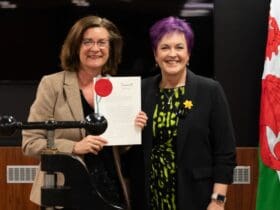Wales’ fostering community is highlighting the benefits of local authority care as The Welsh Government’s landmark Health and Social Care Bill begins the process of removing profit from the children’s care system.
Wales is the first country in the UK to legislate to remove profit from both residential and foster care for children.
Foster Wales’ Staying local campaign, led by care experienced people and local authority foster carers, aims to show how the policy will support young people in care to stay connected to their local area, community, friends, and school.
Last year, 85 per cent of young people with local authority foster carers remained in their area. However, only 31 per cent of young people cared for by commercial fostering agencies stayed local, with 7 per cent being moved outside of Wales entirely.
Em Hattersley, who lived with foster carers as a teenager, now works to support young people in care to explore education pathways. She said being able to stay in her school positively impacted her education.
“When I went into secondary school it was the longest stint of education I had,” explained Em. “Having that consistency in my life was hugely valuable and meant I didn’t have to move around and get used to new people all the time.
“Moving and changing schools really does have an impact on a young person’s identity, so being able to stay local is hugely positive.”


Sophia Warner, 29, was placed in foster care for the first time at the age of two and was in permanent care by the age of eight. Although she says her early life was “chaotic”, it was during this period she found her love for art. As part of the Staying Local campaign, she has produced a painting that symbolises the impact the foster care system has had on her and her family.
Sophia said local authority foster care can help maintain sibling relationships, which she believes should be the priority.
“Staying local does have its benefits,” Sophia said. “Maintaining ties with your community, your school and familiar surroundings can help ease some of that transition, but at the heart of it, it’s about the relationships and connections that young people need to thrive, especially with their siblings.
“Keeping siblings together should always be a priority. It helps young people feel less alone, and it gives them the emotional support they need during such a difficult time.”
Foster carers, Tim and Victoria, from Pontypridd, started fostering with a commercial fostering agency in 2015. They decided to transfer to Foster Wales Rhondda Cynon Taf in 2021 – a move that they described as “the best decision we ever made”.
Victoria explained: “Previously, we’d always cared for older children. When we started fostering through our local authority, we started caring for a younger girl – something we’d never done before. But the help we received was so refreshing.
“Our social worker was, and still is, always at the end of the phone. And, there’s a proper fostering community here. Now, we know more people who are foster carers than ever before – we’ve even got our own WhatsApp group, and we really care for each other.”
Speaking about the changes, Minister for Children and Social Care Dawn Bowden MS said: “I am delighted that the Health and Social Care (Wales) Bill has been passed by the Senedd.
“We want to radically transform children’s services in Wales, and this Bill will enable us to eliminate profit from the care of looked after children within both children’s homes and fostering services.
“We recognise the key role that Foster Wales plays in supporting our vision, and we will continue to support local authority foster care services in Wales to become more sustainable.”
In Wales, there are more than 7,000 children in the care system, but only 3,800 foster families. Foster Wales has set out with the bold aim of recruiting over 800 new foster families by 2026 to provide welcoming homes for local children and young people.
Head of Foster Wales, Alastair Cope, said: “Local authority fostering ensures public finance is retained within local government to support better outcomes and sustainable services for children. It means young people can stay within their local communities and in Wales, which is hugely important.
“We want anyone considering fostering to know that our local fostering teams go above and beyond to ensure both foster carers and young people are fully supported. If you want to find out more about local authority fostering, please do get in touch with your local authority today.”








Leave a Reply
View Comments